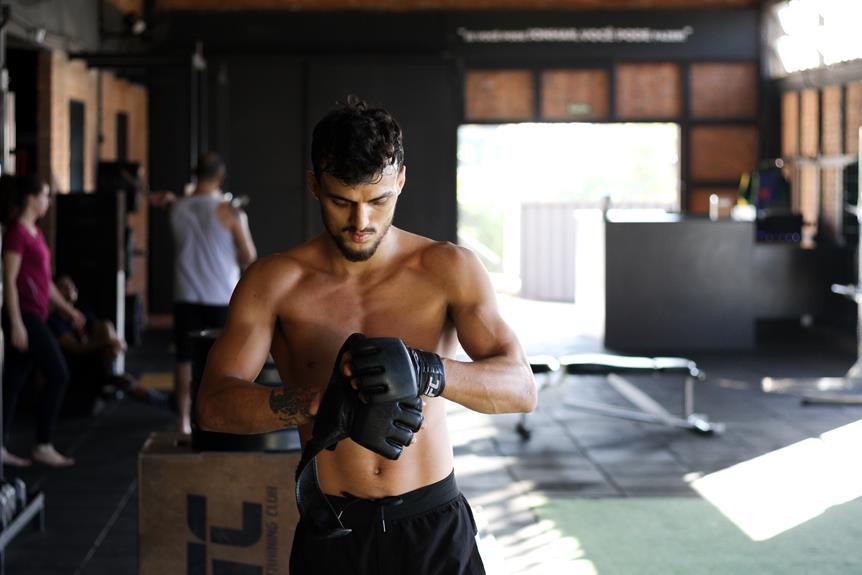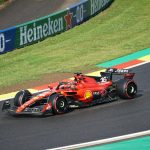In the article 'UFC Fighter Diet: What Do UFC Fighters Eat? (Fully Explained)', readers will gain a comprehensive understanding of the dietary regimen followed by UFC fighters.
This expert guide dives into the importance of balanced nutrition, emphasizing the role of carbohydrates, protein sources, and the significance of fruits and vegetables.
It also explores the use of supplements and extras, along with the caloric intake during different training and competition phases.
Prepare to master the art of fueling for peak performance in the octagon.
Key Takeaways
- UFC fighters prioritize a balanced diet with a good balance of protein, carbohydrates, and fats.
- Fruits and vegetables play a crucial role in the UFC fighter diet, providing necessary micronutrients and energy.
- Supplements such as high-quality protein powder, beta-alanine, caffeine, and electrolytes are commonly used by UFC fighters to enhance performance.
- The UFC fighter diet varies during different phases, including the off-season, fight camp, fight week, and post-weigh-ins, with specific goals and calorie intake adjustments.
Importance of Balanced Nutrition in the UFC Fighter Diet
Balanced nutrition is crucial for optimal performance and health in the UFC fighter diet.
The importance of hydration in the UFC fighter diet can't be overstated. UFC fighters consume approximately a gallon of water per day to ensure proper hydration levels, which is essential for maintaining energy, stamina, and overall well-being during training and competitions.
In addition to hydration, the role of fats in the UFC fighter diet is significant. While fats have been traditionally demonized in the world of sports nutrition, they play a vital role in providing long-lasting energy and supporting hormone production. UFC fighters prioritize healthy fats, such as avocados, nuts, and olive oil, over saturated and trans fats.
These fats aid in the absorption of fat-soluble vitamins and provide a steady source of energy for the demanding physical activities involved in UFC fighting.
The Role of Carbohydrates in the UFC Fighter Diet
During the off-season and fight camp, UFC fighters rely on carbohydrates as their primary source of fuel for optimal performance. Carbohydrates play a crucial role in providing energy for intense physical activity, making them essential for fighters who engage in high-intensity training and competitions. Carbohydrates are broken down into glucose, which is then stored as glycogen in the muscles and liver. This glycogen is readily available for quick energy release during training sessions and fights. Additionally, carbohydrates have been shown to enhance endurance and delay fatigue, allowing fighters to maintain their performance for longer periods.
However, it's important to note that carbohydrate restriction can have an impact on water weight loss. When carbohydrates are restricted, the body utilizes glycogen stores, which are bound to water. As a result, the body loses water weight during the initial stages of carbohydrate restriction. This can be advantageous during fight week when fighters aim to cut water weight for weigh-ins. Nonetheless, it's crucial for fighters to replenish their carbohydrate stores post-weigh-ins to restore optimal energy levels and performance capacity.
Protein Sources in the UFC Fighter Diet
Meat, fish, and eggs are common protein sources in the UFC fighter diet. These protein-rich foods are essential for repairing and building cells, which is crucial for the intense training and physical demands of UFC fighters. However, it's important to note that some fighters may have dietary restrictions that influence their protein sources.
Here are three key points to consider regarding protein sources in the UFC fighter diet:
- Dietary restrictions: Some fighters may follow specific dietary restrictions, such as being vegetarian or having allergies. In such cases, alternative protein sources like plant-based proteins, tofu, or dairy products may be incorporated into their diet.
- Quality and quantity: UFC fighters prioritize high-quality protein sources to ensure optimal muscle recovery and growth. They aim to consume an adequate amount of protein to meet their individual needs, which can vary based on factors like weight, training intensity, and goals.
- Variety: UFC fighters understand the importance of incorporating a variety of protein sources in their diet. This helps ensure they receive a wide range of essential amino acids, which are the building blocks of proteins and necessary for various physiological functions.
The Significance of Fruits and Vegetables in the UFC Fighter Diet
UFC fighters incorporate a wide variety of fruits and vegetables into their diet to ensure they receive essential micronutrients and maintain optimal health and performance. A plant-based diet offers numerous benefits for UFC fighters, as fruits and vegetables are rich in vitamins, minerals, and antioxidants that support overall well-being.
Micronutrients play a crucial role in the UFC fighter diet, as they're essential for energy production, muscle function, and recovery. Leafy greens like spinach and kale are popular choices among fighters due to their high nutrient content. Fruits, such as bananas, blueberries, and apples, provide micronutrients and short-term energy.
Variety is key when it comes to incorporating fruits and vegetables into the UFC fighter diet, ensuring that fighters receive a wide range of nutrients to support their training and performance.
Exploring Supplements and Extras in the UFC Fighter Diet
Fighters in the UFC incorporate a variety of supplements and extras into their diet, such as high-quality protein powder and beta-alanine, to enhance their performance and support their overall health. These supplements play a crucial role in providing the necessary nutrients and aiding in muscle recovery and growth. Additionally, supplements like caffeine and creatine are used to improve focus, endurance, and strength during training sessions.
Hydration is another essential aspect of the UFC fighter diet. UFC fighters consume around a gallon of water per day to stay properly hydrated. Hydration is crucial for maintaining optimal performance and preventing dehydration, which can lead to decreased physical and mental abilities. Electrolytes are also replenished through supplements or sports drinks to help replace minerals lost through sweat and urine.
Caloric Intake Guidelines for UFC Fighters
During different phases of their training, UFC fighters carefully manage their caloric intake by either maintaining a deficit or having a surplus, depending on their specific goals. When aiming for weight loss, fighters create a calorie deficit by consuming fewer calories than they burn. This helps them shed excess body fat and reach their desired weight class. On the other hand, during the off-season or when trying to gain muscle mass, fighters maintain a calorie surplus to support muscle growth and recovery. To optimize their performance, UFC fighters also pay close attention to their macronutrient ratios. They typically consume a balance of protein, carbohydrates, and fats to fuel their training and enhance recovery. The table below illustrates the caloric intake guidelines for UFC fighters during different phases:
| Phase | Caloric Intake Range |
|---|---|
| Off-Season | 500-800 calorie surplus |
| Fight Camp | Maintain or 500 calorie deficit |
| Fight Week | 250-750 calorie deficit |
| Post-Weigh-Ins | 500 calorie surplus |
UFC Fighter Diet During the Off-Season
During the off-season, UFC fighters typically focus on increasing their muscle mass and recovery. This period of rest and recovery is crucial for their overall performance and long-term success in the octagon. Here are three key points to consider about the UFC fighter diet during the off-season:
- Calorie Surplus: UFC fighters consume a calorie surplus of 500-800 during the off-season. This surplus provides the necessary energy to fuel intense training sessions and support muscle growth.
- Macronutrient Balance: The off-season diet includes a good balance of protein, carbohydrates, and fats. Protein is essential for muscle repair and growth, while carbohydrates provide the energy needed for training. Healthy fats support hormone production and aid in nutrient absorption.
- Nutrient Timing: UFC fighters strategically time their meals to optimize recovery. They consume protein-rich meals shortly after training sessions to promote muscle repair. They also prioritize post-workout nutrition by including carbohydrates to replenish glycogen stores and aid in recovery.
UFC Fighter Diet During Fight Camp
Optimizing nutrition is crucial for UFC fighters during fight camp. This involves focusing on fueling their bodies for intense training and recovery. UFC fighter diet meal plans during fight camp are carefully designed to support weight management and provide the necessary nutrients for performance.
Caloric intake is adjusted based on individual goals, with fighters either maintaining their weight or being in a calorie deficit. The meals consist of a balance of protein, carbohydrates, and healthy fats to support energy levels and muscle repair. Whole foods, such as lean meats, fish, eggs, and vegetables, are prioritized for their micronutrient content.
Hydration is also essential, with fighters consuming around a gallon of water per day. Additionally, supplements like high-quality protein powder, beta-alanine, caffeine, and electrolytes may be incorporated to optimize performance.
UFC Fighter Diet During Fight Week
Fueling their bodies for the upcoming fight, UFC fighters carefully plan their diet during fight week to optimize performance and weight management. This crucial phase requires fighters to make strategic adjustments to their nutrition to ensure they're at their peak physical condition on fight night.
However, there are certain risks associated with this process, such as dehydration. To mitigate these risks, UFC fighters pay close attention to the role of electrolytes in their diet. Electrolytes, such as sodium, potassium, and magnesium, help maintain proper fluid balance and muscle function.
UFC fighters incorporate electrolyte-rich foods and drinks into their diet to replenish minerals lost through sweat and urine. This helps them stay hydrated and perform at their best during fight week.
UFC Fighter Diet on Fight Day
While preparing for their fight, UFC fighters continue to eat the same foods they've been consuming throughout their training. Nutrition timing plays a crucial role on fight day to ensure optimal performance and energy levels.
UFC fighters strategically plan their meals to ensure they've enough fuel to sustain them during the fight. They focus on consuming easily digestible carbohydrates to provide immediate energy. Hydration strategies are also essential, as fighters need to maintain proper fluid balance to prevent dehydration and maintain peak performance.
UFC fighters typically consume small, frequent meals leading up to the fight to avoid feeling too full or bloated. They may include foods like lean proteins, whole grains, fruits, and vegetables to provide sustained energy.
It's important for fighters to listen to their bodies and make adjustments to their nutrition plan based on individual needs and preferences.
Can the Fighter’s Diet Influence What They Wear to UFC Events?
When it comes to UFC events, fighters’ diets play a significant role in their performance. But can their diet influence what to wear for ufc fights? While there is no direct correlation, fighters’ diets primarily focus on optimizing their physical condition and weight management. However, this doesn’t dictate their fashion choices at such events, as personal style and comfort take precedence over dietary preferences or restrictions. Ultimately, what to wear for UFC fights depends on fighters’ individual tastes and desired level of comfort.
Conclusion
In conclusion, the UFC fighter diet is a meticulously crafted regimen that focuses on balanced nutrition to optimize performance and health.
By incorporating a variety of fruits, vegetables, protein sources, carbohydrates, and healthy fats, fighters ensure they receive essential nutrients for cell repair, growth, and energy production.
The strategic use of supplements and extras further enhances their physical and mental capabilities.
With careful caloric adjustments during different training phases, UFC fighters are able to maintain peak performance in the octagon.
This diet truly fuels their journey towards greatness.
- 15 Best Martial Arts Weapons (Fighting & Training) - October 14, 2024
- Is Fencing a Martial Art? (Yes, 4 Reasons Why) - October 14, 2024
- 7 Best Martial Arts for Self-defense Ranked (Highly Effective) - October 14, 2024










